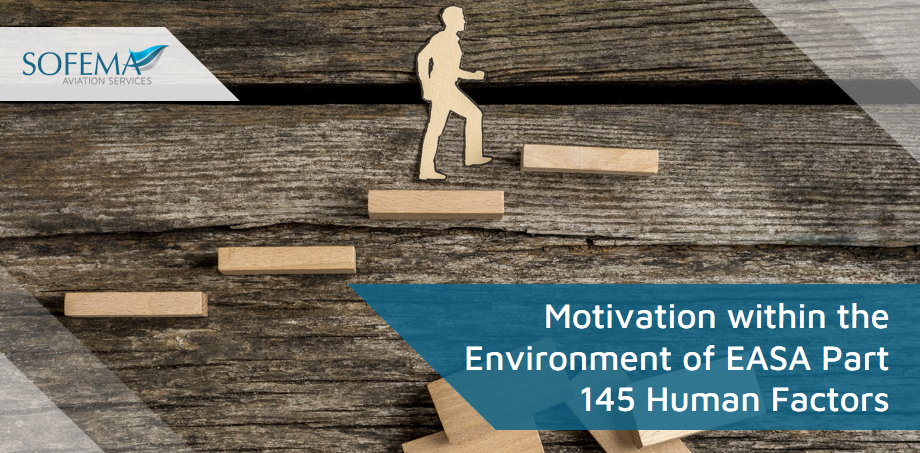Sofema Aviation Services (SAS) www.sassofia.com considers the role of motivation and the connection with Human Factors Training within the Environment of EASA Part 145.
Introduction
In the EASA Part 145 environment, understanding and leveraging both intrinsic and extrinsic motivation are critical to managing human factors effectively. Addressing challenges through best practices ensures that maintenance personnel remain motivated, thereby enhancing safety, efficiency, and overall job satisfaction. Ensuring Maintenance Human factors are treated with the utmost respect is crucial as they directly influence safety, quality, and efficiency. Motivating Part 145 personnel is a crucial aspect of managing these human factors effectively. By fostering an environment that values both internal satisfaction and external rewards, organizations can achieve a more motivated, committed, and productive workforce.
Intrinsic Motivation
Intrinsic motivation refers to engaging in an activity for its inherent satisfaction rather than for some separable consequence. Within the EASA Part 145 environment, intrinsic motivation can be particularly significant because:
- Sense of Achievement: Maintenance personnel often derive satisfaction from successfully diagnosing and fixing complex technical issues.
- Professional Pride: Technicians take pride in ensuring aircraft safety and reliability.
- Interest and Passion: Many individuals in aviation maintenance have a strong interest in aviation and engineering.
Intrinsic Motivation – Challenges & Best Practices
- Monotony: Repetitive tasks can diminish intrinsic motivation over time.
- Complexity and Stress: High pressure and the complexity of tasks can lead to burnout, reducing intrinsic motivation.
- Job Rotation: To combat monotony, rotating roles can keep the work exciting and engaging.
- Continuous Learning: Providing ongoing education and skill development opportunities can enhance job satisfaction and intrinsic motivation.
- Recognition Programs: Acknowledging and celebrating achievements and excellent performance.
Extrinsic Motivation
Extrinsic motivation involves performing a task to earn a reward or avoid punishment. In the EASA Part 145 environment, extrinsic motivators are also important:
- Financial Rewards: Bonuses, salary increases, and other financial incentives.
- Career Advancement: Opportunities for promotion and professional development.
- Recognition and Awards: External recognition of good work through awards and commendations.
Extrinsic Motivation – Challenges & Best Practices:
- Overemphasis on Rewards: Over-reliance on extrinsic rewards can diminish intrinsic motivation and lead to a focus on rewards rather than quality.
- Short-term Focus: Extrinsic rewards sometimes encourage short-term thinking, potentially compromising long-term safety and quality.
- Balanced Reward Systems: Combining intrinsic and extrinsic rewards to ensure a comprehensive motivation strategy.
- Clear Objectives and Feedback: Providing clear performance goals and regular feedback to align efforts with desired outcomes.
- Fair and Transparent Processes: Ensuring that rewards and recognition are distributed fairly and transparently to avoid resentment and demotivation.
Optimum Way Forward – Balanced Approach
A balanced approach that incorporates both intrinsic and extrinsic motivational strategies can be highly effective in the EASA Part 145 environment. Here are some integrative strategies:
- Collaborative Environment: Fostering a team-oriented atmosphere where collaborative efforts are valued and recognized.
- Supportive Leadership: Leaders who provide support, encouragement, and resources to their teams can significantly boost both intrinsic and extrinsic motivation.
Personal Growth Opportunities: Creating pathways for personal and professional growth that cater to both intrinsic desires for self-improvement and extrinsic goals of career advancement.
Next Steps
Follow this link to our Library to find & download related documents for Free.
Sofema Aviation Services (www.sassofia.com) and Sofema Online (www.sofemaonline.com) provide Human Factors, Safety and Maintenance Event Decision Aid (MEDA) Training, together with Training for Trainers in the mentioned Courses. Delivered as Classroom, Webinar and Online courses – Please see the respective websites or email team@sassofia.com
Tags:
classroom training, Safety And Quality, Motivation In Aviation, Extrinsic Motivation, Intrinsic Motivation, Professional Development, Training Programs, Sofema Aviation Serices, Employee Motivation, Career Advancement, Maintenance Training, Aviation Maintenance, Webinar training, SAS blogs, Online courses, Sofema Online, Training for Trainers, Human Factors Training, Human Factors, EASA Part 145, aviation safety




